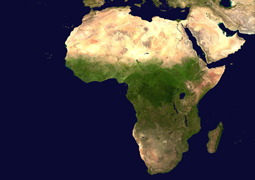
The parliamentary debate on “Building a Better Africa and a Better World” was not only concerned with Africa’s past, it also highlighted its contemporary challenges and state of affairs. Out of which a universal view emerged that Africa’s new beginnings were hampered by ills that stem mainly from its economic under-development.
Most significantly, that Africa won’t emerge from such a quagmire if it were to rely on involuntary and unplanned development. The Africa Day theme was deliberately chosen to assert that Africa’s resurrection can no longer be deferred, but will only be realised by upholding the redeeming values that serve Africa’s developmental agenda, whose seeds were germinated by its esteemed forefathers.
In his opening address, the Deputy Minister of International Relations and Cooperation, Mr Luwellyn Landers, lauded the late Comrade Toivo ya Toivo for his contribution to this vision.
“Allow me to begin by paying homage to the Namibian struggle icon and anti-apartheid activist Herman Andimba Toivo ya Toivo. Comrade Toivo Ya Toivo will be remembered for his tireless struggle towards Africa’s and Namibia’s struggle for emancipation. We use this occasion to express our deepest condolences to his family, to Swapo (South West Africa People’s Organisation) and to the people and government of Namibia. Hamba Kahle Comrade Toivo ya Toivo.”
Pan-Africanism must serve as the foundation for today’s debate during which we will demonstrate our commitment to its ideals and values, he said. “The genesis of our Pan-Africanist ideology and movement was in response to colonisation of the African continent and our resolve to work towards a shared future as Africans.”
But most of all, our Pan-Africanist outlook also did not only inform our past but also our post-democratic vision. “Every generation of our leadership from (President Luthuli to President Zuma) has continued to build upon these ideals in both policy and practice. Our Pan-Africanist outlook as a country is therefore a post-democratic vision grounded in our historical struggle against colonialism, imperialism and apartheid.”
Informed by the foundations laid down by our forebears, the ideals and values of Pan-Africanism shall propel us to realise the aspirations of Agenda 2063, he said.
The Chairperson of the Portfolio Committee on International Relations and Cooperation, Mr Siphosezwe Masango, said the realisation of Agenda 2063 will fulfil the vision of Africa’s forebears.
“The OAU’s (Organisation of African Unity’s – 1963) 1963, and the AU’s (African Union’s – 2002) aspirations embodied in Agenda 2063 are a quintessential fulfilment of the vision of Kwame Nkrumah, Nnamdi Azikiwe, Jomo Kenyatta, Pixley ka Isaka Seme, OR Tambo and many others in the Diaspora.”
As a country we must be proud of our role in fostering peace on the continent, to consolidate peace efforts on the continent, he said.
“We make bold our unassailable assertion that South Africa is proud to have deployed its leadership in brokering peace, deployed peacekeeping forces and continues to participate in periodic Election Observation Missions in the continent. By the way, peace is indeed a conditio sine qua non (an absolutely necessary condition) for development. The objective of silencing the guns by 2020 continues apace.”
Pan-Africanism, once a clarion call, is now somewhat faltering, said Mr Mangaqa Mncwango.
“Although the African Union still champions such efforts, one must question whether there is still a political will and impetus by some member states to strive towards this ideal. Peace, security and stability and good governance are a sine qua non and foundational to the success of the continent.”
The question is, as South Africa, how are we going to contribute to Agenda 2063 when we are faced with a full-blown recession? asked Prof Nhlanhlakayise Khubisa. “We must question whether we are an asset or liability to the realisation of this dream of a greater and better African continent.”
Rev Kenneth Meshoe echoed this sentiment, stating that we cannot build a better Africa and a better world when our unemployment rate is sitting at more than 28% and lawlessness and corruption are at an all-time high. “Corruption is destroying South African economy, employment opportunities and investor confidence. It must be dealt with before we can start dreaming about building a better Africa.”
Patriotic vanity is never enough, we need men and women who are champions of justice, morality and fairness, said Mr Mandlenkosi Galo. Also, global peace can only advance if the vanguard movements jealously guard against the depletion of state coffers, and the abuse of Africa’s natural resources to advance personal cults and interests, he said.
The AU stands by idly when African leaders extend their presidential term limits even when they are well past their sell-by dates. And that does not augur well for good governance upon which “a better Africa and a better world” would be founded, said Ms Santosh Kalyan.
“Here are some cases in support of my point. Zimbabwe has a 93-year-old “sleepy Joe” president who has been in power for 35 years and still wants to run for another term. The president of Equatorial Guinea has been in power for 36 years. The president of Angola has been in power for 36 years. The president of Sudan, a criminal wanted by the International Criminal Court (ICC), has been in power for 26 years. Do you think the citizens of these countries are celebrating Africa Day?” she asked.
By Abel Mputing
13 June 2017

